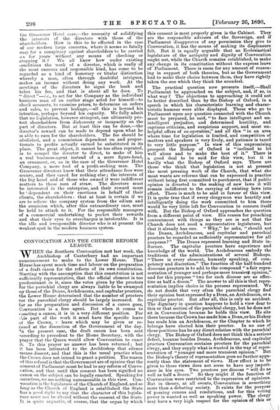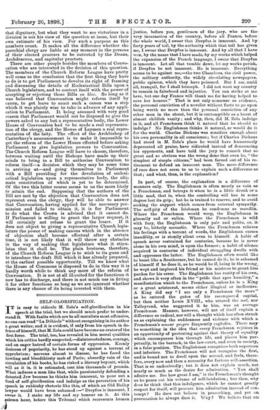CONVOCATION AND THE CHURCH REFORM LEAGUE.
WHEN the Southern Convocation met last week, the Archbishop of Canterbury had an important announcement to make to the Lower House. That House has spent much time and labour on the preparation of a draft canon for the reform of its own constitution. Starting with the assumption that this constitution is not sufficiently representative, that the official element is too predominant in it, since the votes given by the proctors for the parochial clergy are always liable to be swamped .oy those of the Deans, Archdeacons, and capitular proctors, 'the Lower House determined that the number of proctors Isar the parochial clergy should be largely increased. So far as the preparation and discussion of a canon goes, Convocation is a free agent. But when it comes to enacting a canon, it is in a very different position. For tins part of the work it must have the specific leave of the Crown, r. leave which may be given or re- fused at the discretion of the Government of the day. In the present case, the draft canon has been sent according to precedent to the Home Secretary, with the prayer that the Queen would allow Convocation to enact it. To this prayer no answer has been returned ; but it has been intimated to the Archbishop that silence means dissent, and that this is the usual practice when the Crown does not intend to grant a petition. The reason of this refusal is that the Government are of opinion that the consent of Parliament must be had to any reform of Convo- asation, and that until this consent has been signified no canon on the subject can be legally enacted. Speaking for ourselves, we see nothing unreasonable in this view. Con- vocation is the legislature of the Church of England, and so long as the Church of England is established the State bas a good right to say that the character of this legisla- ture must not be altered without the consent of the State. It is quite arguable, of course, that the organ by which this consent is most properly given is the Cabinet. They are the responsible advisers of the Sovereign, and if Parliament disapproves of any permission they give to Convocation, it has the means of making its displeasure felt. But it is equally arguable that an Ecclesiastical legislature of the antiquity and dignity of Convocation ought not, while the Church remains established, to make any change in its constitution without the express leave of Parliament. There is room for any amount of reason- ing in support of both theories, but as the Government had to make their choice between them, they have rightly taken the one which they think the soundest.
The practical question now presents itself,—Shall Parliament be approached on the subject, and, if so, in what way ? The objections to approaching it could not be better described than by the Bishop of Oxford, in a speech in which his characteristic learning and charac- teristic humour were alike displayed. Those who go to Parliament upon any question connected with the Church must be prepared, he said, " to face intelligent and un- intelligent prejudice, and determined hostility, and captious criticism, and suspicious support, and most un- helpful offers of co-operation," and all this " in an area where time for legislation is limited, and competition of matters and speakers is very lively, and patience is taxed to very little purpose." In view of this unpromising prospect the Bishop of Oxford is "inclined to let well alone and to make the best of it" There is a good deal to be said for this view, but it is hardly what the Bishop of Oxford says. There are those who think that legislation is not at present the most pressing work of the Church, that what she most wants are reforms that can be expressed in practice without being first committed to parchment, that if public opinion is diverted to the making of new laws it will remain indifferent to the carrying of existing laws into effect. There is much to be said in favour of this view. It is quite true that if every clergyman was heartily and intelligently doing the work committed to him there would be very little left for Convocation to concern itself with. But the Bishop of Oxford approaches the question from a different point of view. His reason for preaching contentment with things as they are is not that the Church does not need a representative legislature, but that it already has one. " Why," he asks, " should not the Deans, Archdeacons, and capitular and parochial proctors be regarded as sufficiently representative for all purposes ?" The Deans represent learning and State in- fluence. The capitular proctors have experience and knowledge of the world. The Archdeacons embody the traditions of the administrations of several Bishops. " There is every element, humanly speaking, of com- petency and discretion." The function of the half-hundred diocesan proctors is to add to the compound " a fair repre- sentation of younger and perhaps more transient opinion," and for this purpose " two for each diocese are as effec- tive as half a dozen." The answer to all this is that repre- sentation implies choice in the persons represented. We do not doubt that very often the parochial clergy find their opinion best expressed by a Dean, an Archdeacon, or a capitular proctor. But after all, this is only an accident. The dignitary in question happens to hold a view dear to this or that section of the parochial clergy, but he does not sit in Convocation because he holds this view. He sits there because the Crown has made him a Dean, or his Bishop has made him an Archdeacon, or the Chapter to which he belongs have elected him their proctor. In no one of these positions has he any direct relation with the parochial clergy. The Bishop of Oxford does not think this a serious defect, because besides Deans, Archdeacons, and capitular proctors Convocation contains proctors for the parochial clergy, and they supply what is wanted in the way of repre- sentation of "younger and more transient opinion." But the Bishop's theory of representation goes no further appa- rently than the statement of views. How effect is to be given to these views does not seem to have any import- ance in his eyes. Two proctors per diocese " will do as well as half a dozen." So they might if the function of Convocation were restricted to the expression of opinions. But in theory, at all events, Convocation is something more than a debating society. It exists for the purpose of passing canons and resolutions, and for this voting power is wanted as well as speaking power. The clergy may have a very high respect for the opinion of this or
that dignitary, but what they want to see victorious in a division is not his view of the question at issue, but their own estimate of his view. For such a purpose as this numbers count. It makes all the difference whether the parochial clergy are liable at any moment in the persons of their elected proctors to be outvoted by the Deans, Archdeacons, and capitular proctors.
There are other people besides the members of Convo- cation who are interested in the decision of this question. The members of the Church Reform League have pretty well come to the conclusion that the first thing they have to do is to get Parliament to devolve its right of framing and discussing the details of Ecclesiastical Bills upon a Church legislature, and to content itself with the power of accepting or rejecting these Bills en bloc. So long as it was believed that Convocation might reform itself by canon, to get leave to enact such a canon was a step which it was plainly wise to take in advance of any appli- cation to Parliament. It being assumed with very good reason that Parliament would not be disposed to give the powers asked to any but a representative body, the Lower House of Convocation had to be made a real representa- tion of the clergy, and the House of Laymen a real repre- sentation of the laity. The effect of the Archbishop of Canterbury's announcement is to make it impossible to get the reform of the Lower House effected before asking Parliament to give legislative powers to Convocation. The Church Reform League will have to choose, therefore, between waiting until the Bishops have made up their minds to bring in a Bill to authorise Convocation to reform itself—a decision which they may be some time in arriving at—and going themselves to Parliament with a Bill providing for the devolution of ecclesi- astical legislation upon a representative body, the ulti- mate constitution of which is yet to be determined. Of the two this latter course seems to us the more likely to attain the end. Supposing that the authors of the Bill are met by the objection that Convocation does not represent even the clergy, they will be able to answer that Convocation, having applied for the necessary per- mission and failed to obtain it, it is for Parliament to do what the Crown is advised that it cannot do. If Parliament is willing to grant the larger request, it will certainly not refuse to grant the lesser. If it does not object to giving a representative Church legis- lature the power of making canons which in the absence of objection shall become effectual after a certain time, it is not likely that it will throw any obstacles in the way of making that legislature what it stipu- lates that it shall be. The plain business, therefore, of the Church Reform League is to stick to its guns and to introduce the draft Bill which it has already prepared, at the earliest possible opportunity. Till we know what the House of Commons is disposed to do in this way it is hardly worth while to think any more of the reform of Convocation. It is not at all ill-suited for the functions it now has to discharge, and there is not much use in fitting it for other functions so long as we are ignorant whether there is any chance of its being invested with them.







































 Previous page
Previous page